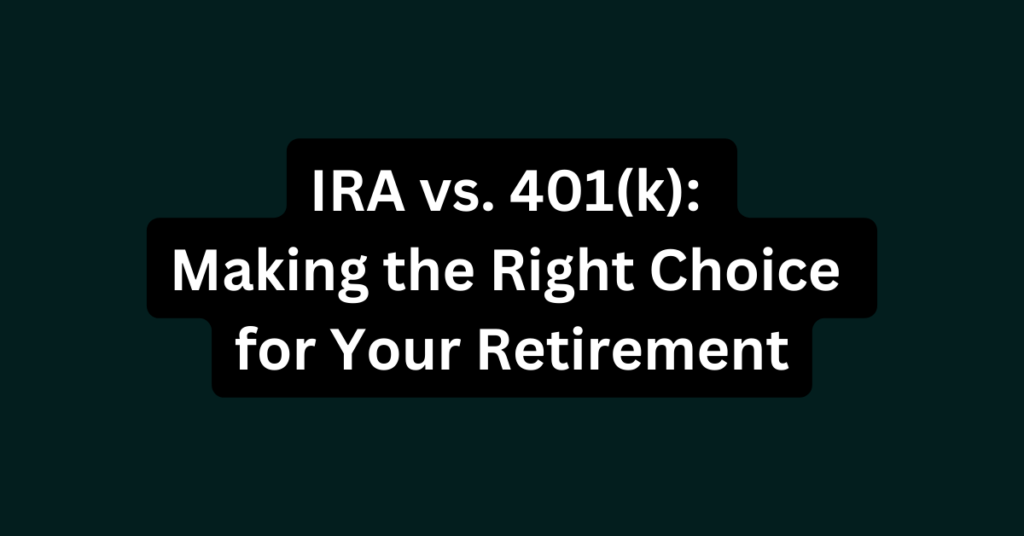Planning for retirement is a significant financial milestone, and selecting the right retirement account is a pivotal decision in that process. Two popular choices are the Individual Retirement Account (IRA) and the 401(k) plan, each with its unique features and benefits. To make the right choice for your retirement, it’s essential to understand the distinctions between the two and align them with your financial goals. In this comprehensive guide, we’ll explore the key factors to consider when deciding between an IRA and a 401(k).

IRA vs. 401(k): A Comparative Analysis
Let’s start by examining the critical aspects of both IRAs and 401(k) plans:
1. Individual Retirement Account (IRA):
Pros:
1. Versatility:
– IRAs offer flexibility in terms of contribution amounts and investment choices. You have control over how you invest your funds.
2. Tax Benefits:
– Depending on the type of IRA (Traditional or Roth), you can enjoy either tax deductions on contributions or tax-free withdrawals in retirement.
3. No Employer Requirement:
– IRAs are not tied to your employer, making them accessible to anyone with earned income.
4. Investment Control:
– You have the freedom to choose your investments within an IRA, giving you more control over your portfolio.
Cons:
1. Contribution Limits:
– IRAs have lower annual contribution limits compared to 401(k) plans, potentially limiting your retirement savings.
2. No Employer Match:
– IRAs do not offer employer matching contributions.
3. Investment Responsibility:
– Managing your IRA investments requires a certain level of financial knowledge and responsibility.
4. Income Restrictions:
– Roth IRAs have income limits that may restrict high earners from contributing.
Ready to Secure Your Retirement Future?
Explore Our Expert Guide on Choosing Between IRA and 401(k). Join Our Free Retirement Planning Newsletter for Expert Advice, Bonus Podcasts, and Insights from Our Community!
2. 401(k) Retirement Plan:
Pros:
1. Higher Contribution Limits:
– 401(k) plans allow for significantly higher annual contributions, making them ideal for individuals looking to maximize retirement savings.
2. Employer Matching:
– Many employers offer matching contributions to 401(k) plans, effectively providing “free money” for your retirement.
3. Automatic Payroll Deductions:
– Contributions to a 401(k) are often made through automatic payroll deductions, promoting consistent savings habits.
4. Potential for Loans:
– Some 401(k) plans allow participants to take loans from their accounts in case of financial emergencies.
Cons:
1. Limited Investment Choices:
– 401(k) plans typically offer a limited selection of investment choices, potentially limiting your diversification options.
2. Employer Dependence:
– You can only access a 401(k) plan if your employer offers it, leaving you dependent on your employer’s retirement benefits.
3. Vesting Periods:
– Some employer contributions may be subject to vesting periods, meaning you won’t fully own them until you’ve worked for the company for a certain duration.
4. Less Control:
– With a 401(k), you have less control over investment choices, as your options are typically determined by the plan sponsor.
Considerations for Making the Right Choice
The decision between an IRA and a 401(k) should align with your unique financial situation and retirement objectives:
1. Employer Offerings: If your employer provides a 401(k) with matching contributions, consider taking advantage of this valuable benefit, as it can significantly boost your retirement savings.
2. Tax Considerations: Evaluate whether the immediate tax deduction of a traditional IRA or the tax-free withdrawals of a Roth IRA align better with your financial goals and tax strategy.
3. Contribution Limits: If you aim to contribute a substantial amount to your retirement savings, a 401(k) allows for higher contributions.
4. Investment Control: If you prefer a broader range of investment options and more control, an IRA may be your preferred choice.
5. Diversification: Consider how each account aligns with your overall investment portfolio and diversification strategy.
In conclusion, the choice between an IRA and a 401(k) is a crucial aspect of retirement planning. Both accounts offer unique advantages, and you may even choose to utilize both to create a well-rounded retirement savings strategy. To make the right decision, consult with a financial advisor who can provide personalized guidance tailored to your needs.
Take Control of Your Financial Destiny!
Delve into the IRA vs. 401(k) Decision with Confidence. Subscribe Today and Gain Access to Expert Insights, Bonus Podcast Episodes, and Exclusive Community Perspectives!
Disclaimer: This article provides general information about IRAs and 401(k) plans and is not intended as financial advice. Please consult a financial advisor for personalized guidance.
Pingback: Understanding IRA vs. 401(k): A Comprehensive Guide